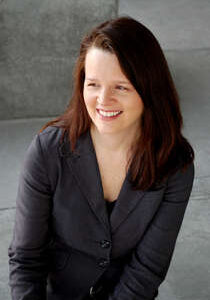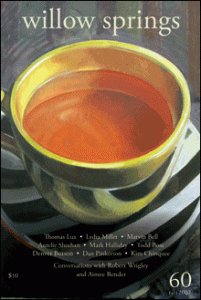
About Aurelie Sheehan
Aurelie Sheehan is the author of two novels and two short story collections, most recently, Jewelry Box: A Collection of Histories (BOA Editions, Ltd.). Earlier pieces from this project were published in Willow Springs 60. Her work has also appeared in Alaska Quarterly, Conjunctions, Epoch, Fairy Tale Review, Fence, New England Review, The New York Times, Ploughshares, and The Southern Review. She has received a Pushcart Prize, a Camargo Fellowship, and the Jack Kerouac Literary Award. Sheehan teaches fiction at the University of Arizona in Tucson.
A Profile of the Author
Notes on “5 Stories”
In these pieces (as well as in my new book, Jewelry Box: A Collection of Histories), I’m looking at story and history and autobiography and invention in a lot of different ways. I started this project with the idea of writing one hundred histories (also the original title). I’ve always been a chancy and bad student of history—can’t remember dates, presidents, etc.—and yet I’m also obsessed with history and how it plays out in our daily lives. These pieces are part of that inquiry. What is underneath a tube of suntan lotion or a T-shirt, or a strange profusion of plastic bits on the road? To me, these items explode with history.
So it’s not textbook history, of course, but a kind of subjective history. The place fiction and nonfiction really intersect here is in perspective. I think of these as “histories,” knowing full well there are just as many other histories to refute or echo or elaborate on them. A T-shirt means one thing to you, one thing to me, and another thing to me yesterday. Therefore, my history is fiction of a kind. It’s one perspective: it’s not reality.
But still, it matters to me that many of these pieces have origins in autobiography. As a fiction writer, I found it exciting to more boldly use my own experience as material. I think I’m realizing how many ways memory and imagination intersect, with or without my say-so. Here, I use my own life freely, but I also use third person, or imagined situations, when it feels necessary. (Luckily, we’re calling this fiction overall, so I’m not pulling the wool over anyone’s eyes in that less-than-pleasing way.)
Notes on Reading
It would definitely be the case that reading Lydia Davis’s short work gave me, years ago, a sense of new possibility. But the awesome joy of reading a book of fiction that I love is what transforms me and fuels me, no matter how removed the aesthetic or form is from my own current project. In fact, usually I read stuff that is far from what I’m trying to do at that particular moment, so I don’t get distracted by other writers’ voices and ideas. Sometimes I do go for something with a healthy antidote effect. For instance, Haruki Murakami’s prose can help me get over a case of the Adjectives.
I’m excited by some of the other short short work out there in this world—whether it is called fiction or nonfiction or poetry. Mary Ruefle, Maggie Nelson, Julio Cortázar, and Anne Carson come to mind. Some other favorite writers are Katherine Mansfield, Deborah Eisenberg, Frederic Tuten, Virginia Woolf, Zadie Smith, George Saunders, and Edward P. Jones.


